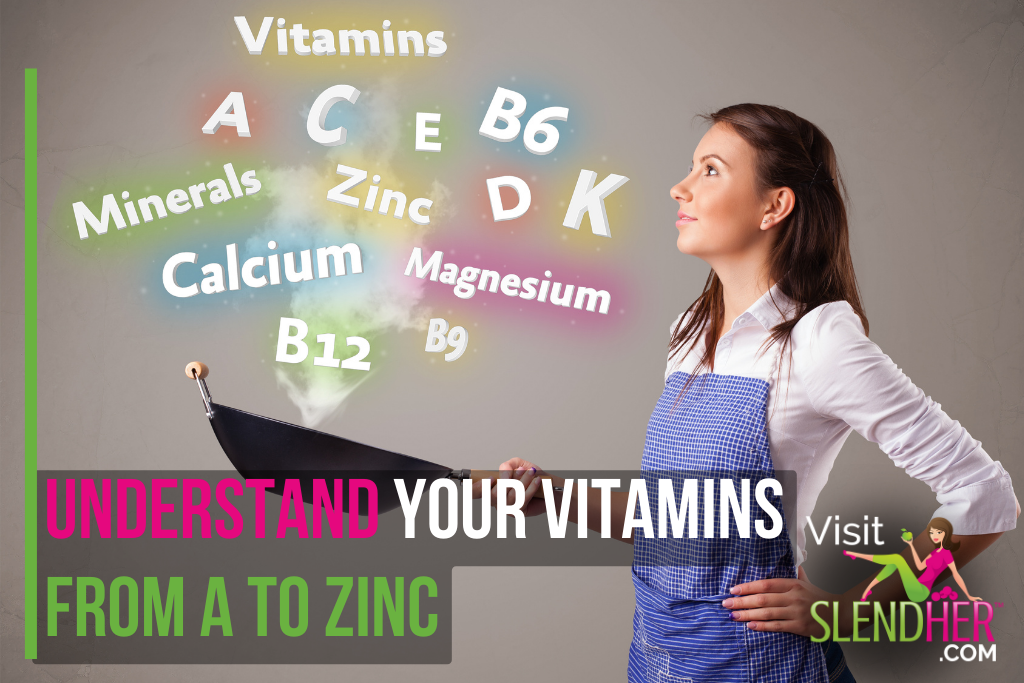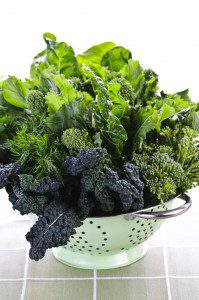
If you’ve ever been tired after a full night’s sleep, got a cavity despite being an avid brusher and flosser, or felt generally sad in the winter but normally lead an amazing life, then your essential nutrients may be out of whack. You could start with a multivitamin pill or chew, but if you’re deficient in D or K for example, an all-purpose approach may not provide the balance you’re after. Also, doctors and dietitians say whole foods are a much better way to make up for lost nutrients. If you’re lost on what to take and how, we’ll have you singing the A, B, Cs of vitamins in no time.

Vitamin A
Consider taking it if: Your night vision is poor, you skin is dry or cracked, or you have trouble smelling, tasting, or hearing.
Eat: Dark-colored fruits and veggies, dairy, and fish
Vitamin B1 (Thiamine)
Consider taking it if: Your appetite has decreased, you’ve lost weight without trying, or have had stomach issues including indigestion, nausea, or vomiting.
Eat: Liver, but if that’s not your thing go for whole or fortified grains instead.
Vitamin B2 (Riboflavin)
Consider taking it if: You have anemia, have unexplained skin rashes, cracked lips, or mouth and tongue soreness.
Eat: Eggs, dairy, and fortified cereals and bread
Vitamin B3 (Niacin)
Consider taking it if: You’ve been diagnosed with pellagra, which is simply defined as a niacin deficiency. The symptoms include indigestion, canker sores, fatigue, vomiting, and depression.
Eat: Protein sources such as fish, meat, poultry, and eggs
Vitamin B12
Consider taking it if: You suffer from anemia, which means your body is not producing red blood cells–the very thing B12 can do.
Eat: Meats, dairy, fish, and shellfish
Vitamin C
Consider taking it if: You have scurvy. However, a more likely reason to take vitamin C would be to prevent the common cold, treat the common cold. When you start to feel run down, amp up your C intake and drink lots of fluids.
Eat: Citrus fruits, strawberries, and tomatoes
Calcium
Consider taking it if: You experience dry or cracked skin, muscle cramping, increased menstrual cramping, or have a family history of osteoporosis.
Eat: Dark leafy greens, dairy products, okra, almonds, and broccoli
Vitamin D
Consider taking it if: You have a family history of osteoporosis to better help absorb calcium. Also, if you tend to get depressed in the winter, it may be caused by lack of sunlight–from where vitamin D comes.
Eat: While sunshine is the best source, you can also find the D in fortified milk and fatty fish.
Vitamin E
Consider taking it if:Your hair and skin are looking a little lackluster. Vitamin E helps with circulation and cell regeneration, which is said to have positive effects on anti-aging.
Eat: Fruits, veggies, vegetable oils, and nuts
Folic Acid
Consider taking it if: You’re diagnosed with anemia. Part of the Vitamin B family, folic acid helps to regenerate red blood cells.
Eat: Citrus fruits, leafy green vegetables, and fortified cereals

Iron
Consider taking it if: You’re pregnant (and your doctor gives the OK), have hemorrhoids or bleeding ulcers, or if you have anemia.
Eat: Poultry, red meat, seafood, lentils, beans, and whole grain breads and cereals
Vitamin K
Consider taking it if: You have problems with varicose veins, tooth decay, or a history of osteoporosis. Vitamin K is also linked to aiding in blood clotting.
Eat: Strawberries, spinach, asparagus, meat, beans, and eggs
Magnesium
Consider taking it if: You’re experiencing increased stress, anxiety, problems sleeping, or hyperactivity. Also consider it if you have muscle cramping, eye twitches, or muscle spasms.
Eat: Spinach, nuts and seeds, avocados, fish, dried fruit, and dark chocolate
Zinc
Consider taking it if: You’re have a cold, severe diarrhea, acne, or gastric ulcers.
Eat: Legumes, oysters, beef, pumpkin seeds, and nuts
Be sure to consult your physician before adding any vitamins or supplements to your diet. While the symptoms described in this article may be related to a vitamin deficiency, your doctor will best help you assess your wellness and prescribe the right approach for your needs.
How do you get your vitamins each day? Tell us about food, supplements, or pills you take in the comments.

Sources
WebMD
Helpguide.org
AARP
Dummies
Women’s Health
Newsmax

[…] It’s a busy world out there, which means most people are in search of food that they can grab and go. But just because something may look, smell, taste, and make your mouth water like food, doesn’t mean it is in fact real food. Processed foods are all around you–the grocery store, at restaurants, and likely in your own kitchen. While processed may offer conveniences, it’s robbing your body of much-needed nutrients. […]